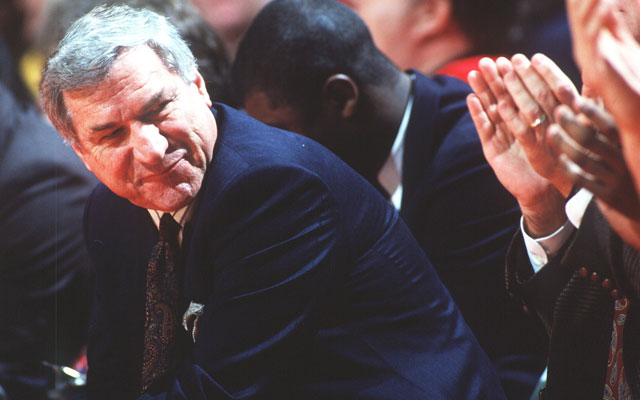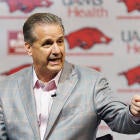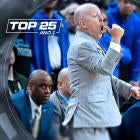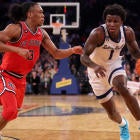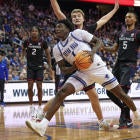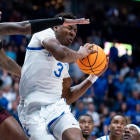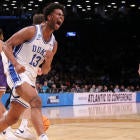Every now and then, when someone is talking about an accomplished coach or player or actor or musician -- you know, anybody with unique talents -- you'll hear that person say, "He's a great coach/player/actor/musician ... but an even greater man."
And it's such a cliche -- one that flies in the face of reality.
I mean, think about it. If you're one of the great coaches or players or actors or musicians (or whatevers), that means you're in the top 1 percent of your profession. So to be "an even greater man" would require you to, at the very least, also be in the top 1 percent of men in the world, and surely you can see how silly it is to suggest that about basically anybody.
That's why I roll my eyes each time I hear that phrase.
And yet, on this Sunday morning, I haven't rolled my eyes once even though I've read and heard that phrase connected to former North Carolina coach Dean Smith dozens of times already. Based on the life he lived, calling Smith an "even greater man" feels right. Given the things he did outside of basketball, I can't imagine anybody arguing with the sentiment.
"Other than my parents, no one had a bigger influence on my life than Coach Smith," said NBA legend Michael Jordan, who played for Smith at North Carolina from 1981 to 1984. "He was more than a coach. He was my mentor, my teacher, my second father."
The tributes started rolling in moments after UNC officials announced early Sunday that Smith -- a member of the Naismith Memorial Basketball Hall of Fame, the FIBA Hall of Fame, the North Carolina Sports Hall of Fame, the Kansas Sports Hall of Fame and the College Basketball Hall of Fame -- died Saturday night at his home. He was 83 years old.
Michael Jordan released a statement.
So did Roy Williams.
So did Mike Krzyzewski.
So did lots of basketball figures.
Meantime, on social media sites, people from all walks of life offered condolences and shared stories about this iconic figure who, in November 2013, received the Presidential Medal of Freedom from President Barack Obama. And what struck me most is how lots of the great stories, if not most of the great stories, had nothing to do with basketball.
| Dean Smith Through the Years |
| Feb. 28, 1931: Dean Edwards Smith born in Emporia, Kan. |
| 1952: As a junior guard at Kansas, the Jayhawks win the NCAA championship |
| 1953: After graduating Kansas, joins Jayhawks coaching staff as a graduate assistant |
| 1958: Joins Frank McGuire's staff as an assistant coach at North Carolina |
| 1961: At the age of 30, named head coach at University of North Carolina |
| 1967: The Tar Heels win the first of 17 ACC regular-season championships, 13 ACC tournament championships and make the first of 27 NCAA tournament appearances under Smith |
| 1968: North Carolina makes the first of five appearances in the NCAA championship games under Smith, losing to UCLA |
| 1976: Coaches USA to gold medal in Olympics in Montreal |
| 1982: North Carolina defeats Georgetown to win NCAA championship on Michael Jordan's late shot to give Smith his first NCAA title |
| 1983: Elected to Naismith Memorial Basketball Hall of Fame |
| 1993: North Carolina defeats Michigan to give Smith his second NCAA championship |
| 1997: Wins his 877th game, passing Kentucky's Adolph Rupp as the coach with the most NCAA victories as North Carolina defeats Colorado in the NCAA East Regional |
| 1997: Announces retirement from North Carolina after winning 879 games in 36 years, all with the Tar Heels |
| 2006: Named to the inaugural class of the National Collegiate Basketball Hall of Fame |
| 2013: Awarded Presidential Medal of Freedom |
| Feb. 7, 2015: Dean Edwards Smith passes away at his home in Chapel Hill, N.C. |
Sure, winning 879 games and two national championships while making 11 Final Fours will forever be important bullet points on Smith's Wikipedia page, as they should be. But what he did away from the court, in his personal life, is maybe more impressive.
Smith was instrumental in desegregating Chapel Hill, then in desegregating the entire Atlantic Coast Conference. He used his position of power to essentially force restaurants to serve black customers at a time when some establishments in Chapel Hill would not, helped a black man buy a home in an all-white neighborhood, and, in 1966, enrolled Charlie Scott, who became the first African-American scholarship athlete at North Carolina.
Furthermore, Smith protested, among other things, the Vietnam War, the proliferation of nuclear weapons, and the death penalty. In 1998, according to a story in the University Gazette, Smith appeared at a clemency hearing for a death-row inmate and told then-Governor Jim Hunt, right to his face, "You're a murderer. The death penalty makes all of us murders."
In other words, yes, Dean Smith was a basketball coach. But he wasn't just a basketball coach. He's a man who touched the life of the greatest basketball player to ever live ... and also millions of other lives in countless and crucial ways. He never settled for a whistle and a ball, never stayed in his so-called lane, never stopped trying to make things better until a cruel disease robbed him of his mind.
So was Dean Smith an even better man than he was a coach?
Honestly, that's hard to say, if only because he was a damn fine coach.
But he was a damn fine man, too.
An amazing man, actually.
And the world feels like a lesser place without him.
>> More on Dean Smith: Smith touched many lives | Browse photos of Smith
